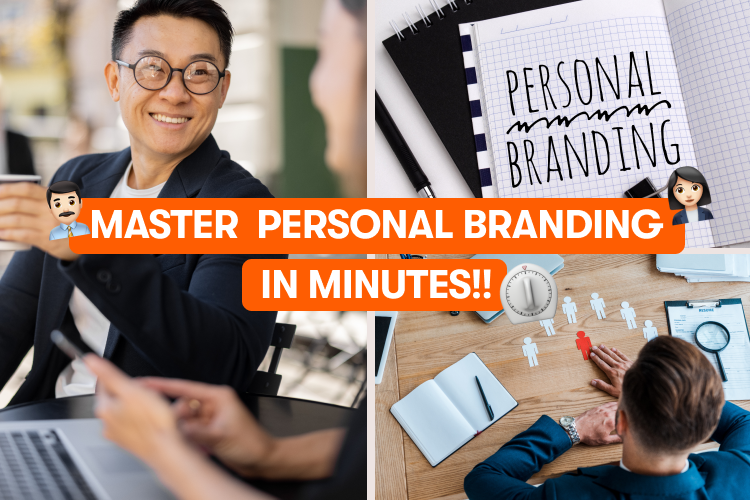
Want More Career Wins? Here's How to Build a Personal Brand That Gets Noticed
|
|
Time to read: 5 min
How to Build a Strong Personal Brand That Opens Doors and Attracts Opportunities
What is a Personal Brand?
Let’s start with the basics: your personal brand is how you present yourself to the world—professionally and personally - and also how others perceive you.
It’s a combination of your values, skills, and how you interact with others. Your personal brand isn’t just about social media or a curated LinkedIn profile. It’s shaped by the content you share, the way you communicate, and how you handle relationships both online and offline.
Whether you're a freelancer, a business owner, or climbing the corporate ladder, a strong personal brand is essential.
It’s your opportunity and job to stand out and take control of how you’re seen by potential employers, clients, or collaborators.
Why You Need a Strong Personal Brand?

1. Builds Trust and Credibility
When you have a clear and consistent strong personal brand, people know what to expect from you. That consistency creates trust, and people are more likely to engage with you or seek your services if they know what to expect.
For example, if you’re known as the go-to expert in sustainable marketing, your audience will naturally turn to you for advice or collaboration. Trust opens doors, plain and simple!
2. Helps You Stand Out
There’s a lot of competition out there.
With so many professionals, companies, and freelancers all vying for attention, a strong personal brand can help you stand out from the crowd. Whether you’re applying for a job, selling a product, or marketing your services, you need to know how to make yourself memorable.
Your experiences, skills, and perspective are your differentiators, so lean into them!
3. Attracts Opportunities
When your personal brand is solid, you won’t have to chase every opportunity—they’ll come to you (naturally). Employers, clients, and collaborators often scout for people with strong reputations. Your personal brand works as a magnet, drawing in the kind of opportunities that match your goals!
4. Builds Long-Term Relationships
Building a personal brand isn’t something you do once and forget about—it’s an ongoing thing.
When you consistently show up, add value, and stay true to yourself, you’ll start building real, lasting relationships. This can lead to more trust, more opportunities, and even people who’ll hype you when you’re not around.
Just keep it consistent, because how you show up over time is what really leads to long-term success.
How to Build a Strong Personal Brand?
Now that we’ve covered the why, let’s get into the how. As you should know, building a strong personal brand doesn’t happen overnight, but with the right steps, it’s absolutely doable.
1. Define Your Unique Value Proposition (UVP)

First things first: what makes you you? Your unique value proposition is the combination of your skills, passions, and expertise.
Ask yourself:
- What do I excel at?
- What topics or areas am I passionate about?
- Who is my target audience?
Once you’ve answered these questions, you’ll have a clearer idea of what makes you unique. And when you combine what you’re good at with what you love, you’ll naturally stand out.
For example, if you’re a finance professional who loves simplifying complex topics for young adults, that’s your niche right there.
2. Audit and Align Your Online Presence
Most people are going to Google you before they meet you (I know I do!) So, make sure whatever they find reflects the personal brand you want people to see.
Here’s what you can focus on:
- Social Media: Update your profiles to reflect your professional identity. Use a consistent photo, bio, and tone across platforms.
- Content Cleanup: Delete or archive posts that no longer fit your image. It’s totally fine to keep a few old ones, but make sure there’s nothing sensitive or anything that could come back to haunt you when meeting someone new.
- Visibility: Make sure you are active on the right platforms. Whether it’s LinkedIn, Facebook, or Instagram, choose the platforms where your target audience hangs out.
Pro Tip: When building your personal brand, having a digital name card can make sharing your contact details effortless and professional, adding to your credibility
3. Create and Share Valuable Content

Content is one of the fastest ways to establish yourself as an expert. Whether it’s blog posts, LinkedIn articles, or Instagram reels, sharing your knowledge adds value to your audience.
Think about the topics you’re passionate about and start writing or creating around them. For example, if you’re an HR professional, you could create content around interview tips, workplace trends, or career growth strategies.
4. Network Strategically
Enough of simply posting online, let’s talk about building real relationships, both online and offline.
- Join industry events, webinars, or meetups to meet liked-minded people.
- Don’t just follow people online—comment on others’ posts, share your thoughts, and get involved in meaningful conversations with thought leaders in your niche.
- Stay genuinely curious and helpful when connecting with others.
Remember, you’re not asking for favors; you are looking to build mutually beneficial relationships.
5. Stay Authentic and Consistent
One of the most important things to remember when building a personal brand is to stay true to who you are. People can spot fake personas a mile away, so don’t try to be someone you’re not.
Be honest about your experiences, even the messy ones—they’re still part of your story.
Consistency is equally important. From your tone of voice to your visual identity, ensure that every aspect of your personal brand aligns with your UVP.
Common Mistakes to Avoid
As you work on building your personal brand, it’s easy to trip up too. Here are a few common mistakes you can avoid:
- Trying to Be Everything to Everyone: Focus on your niche and audience, so that you can showcase your strengths and goals. Trying to be everything to everyone will only dilute your message.
- Inconsistent Messaging: Mixed signals confuse people. Keep your tone, content, and visuals aligned.
- Ignoring Offline Branding: Your personal brand isn’t just digital. How you act in person—during meetings, events, and conversations—also contributes to how others perceive you.
Why You Need a Strong Personal Brand and How to Build It
If you’re short on time, here’s the TL;DR:
- Why You Need It : A strong personal brand builds trust, helps you stand out, attracts opportunities, and fosters lasting relationships.
- How to Build It : Define your unique value proposition, align your online presence, create valuable content, network strategically, and stay authentic.
Your personal brand is your most valuable professional asset. Don’t just think of looking good online; you should build trust, showcase your skills, and use that to create opportunities. Start small—define your UVP, clean up your online presence, and create content that resonates. Over time, your personal brand will grow into a powerful tool for success.
Start building your strong personal brand today! The opportunities are out there—your brand is just waiting to pull them in.






